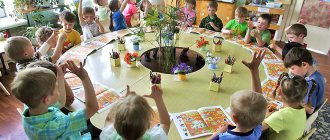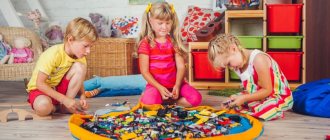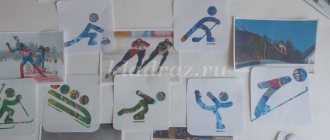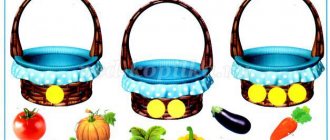Didactic games in economics for older preschoolers with goals
Card index of didactic games on the economic development of children of senior preschool age 5-7 years.
The material will be useful to preschool teachers of any type who implement gaming technology in their work.
Game “Train of Coins and Banknotes” Purpose: to teach how to build a sequence of increasing and decreasing the value of coins and banknotes. Material: A set of coins for each child for practical activities, a “train of coins and bills”, where children can arrange coins and bills in increasing and decreasing sequence; Progress of the game: - A “train of coins and bills” came to visit us. What kind of cargo do you think he is carrying? (coins) - Correct, but the coins on this train are located in a certain order. The first carriage carries a coin of the highest denomination. Look at your coins, which coin can travel in the first carriage? - Let's put a 5 ruble coin in the first carriage, what coin will go in the next carriage? Next, the children distribute the coins among the cars in descending order of denomination. - What coin is in the last carriage? This means that this coin is of the lowest denomination (1 kopeck). You can ask the children questions about this task: Which coin is in the carriage between 1 kopeck and 10 kopecks? - Guys, is it possible to distribute banknotes among the carriages in the same way (children distribute banknotes among the carriages). Game “If..., then...” Goal: introduce the following concepts into the active vocabulary: “grocery store”, “manufactured goods store”, learn to differentiate concepts, find similar and distinctive features; Clarify children's ideas about different types of stores. Progress of the game: - Guys, I will tell you a sentence, and you will have to continue this sentence, for example, “If you go to a grocery store, what can you buy there?” • If you go to a shoe store, what can you buy there? • If we go to a clothing store, what will we buy there? • If we go to a furniture store, what will we buy there? • If you go to a grocery store, what can you buy there? • If you go to a department store, what can you buy there? The game “What is sold where?” Goal: to learn how to distribute items for sale in different types of stores. Material: pictures depicting various types of goods. Progress of the game: - Look, guys, here we have a lot of goods that you can buy in the store. In which store can you buy these products? We look at pictures with children depicting goods (bread, loaf, sausage, skirt, shampoo, washing powder, toothpaste, jacket, and others). Together with the children, we determine which store sells the presented product. Game "Expensive - Cheap". Goal: to teach children to correlate the price and quality of a product. Material : morphological table with the names of different types of stores and products sold in them. Red signs indicate expensive goods, blue signs indicate cheap goods. Progress of the game: - Look, guys, we have various goods here. And I have such interesting signs - blue and red - the blue sign indicates a cheap product, and the red sign indicates an expensive product. What do you think is the most expensive and cheapest product? Lay out the signs. — Place red signs near expensive goods, and blue signs near cheap goods. Why did you decide so? Game “Shop” Purpose: to teach children to practically carry out the actions of purchasing goods, to say out loud the phrase “WORTH IT,” “I’M CRYING,” “CHANCE.” Material: small goods or illustrations of goods, price tags; money to buy goods for each child, product catalogs, price tags. Progress of the game: - Guys, let's play shop. - What do we need for this? — The right product, put price tags on the product, put it on the shelves. Together with the children, we determine the prices of goods, write price tags, and arrange goods on shelves.
We choose a seller or the teacher himself can play this role at the beginning of the game. We require the following sequence of questions and answers from children: - What, Masha, do you want to buy?
— I want to buy milk. It costs 12 rubles. I give you 15 rubles. - Here's 3 rubles in change. We interview several children. Then you can change the seller. Game "Auction" Purpose : to teach children to establish a connection between price, cash amount and change. Material : small goods or illustrations of goods, money. Progress of the game : All children are given money to purchase goods.
- Look, guys, I have a beautiful teddy bear in my hands.
Who wants to buy it? — The bear costs 5 rubles. - Who will buy Mishka? -There are many people who want to buy the Bear, then I add the price. The bear costs 6 rubles. Who has that amount of money? Next, we sell a few more toys to the children. You can use the word “Cost” (What is the cost of Mishka?) to introduce it into the child’s active vocabulary. Outdoor game “Find a Pair” Purpose : to teach children to establish the relationship between the dignity of money. Material : coins and bills of different denominations (one set of coins and bills for each child). Progress of the game: Children dance to the sound of music; when the music stops, children must find a pair according to the value of the coins. A pair consists of children, where one has a coin of a lower denomination, and the other has a coin of a higher denomination. Game "What does it do?" Goal : Clarify the names of such professions as doctor, teacher, driver, artist; strengthen children's ideas about professions. Progress of the game: - I will tell you the profession, and you will name what the person does. Cook - cooks porridge; Turner – makes parts; Doctor – treats people; A teacher teaches children; Driver – drives the car; Seller – sells products and goods; — What other professions do you know? What do people in these professions do? The game “Who works where?” Goal : learn to establish a connection between a person’s place of work and profession. Progress of the game: - Works in the police... - Works in a store... - Works in a bakery... - Works in a taxi... - Works in a fire department... - Works in a school... - Works in a hospital... You should draw the attention of children to what can be called not one profession, but several: Doctors, nurses, cleaners, cloakroom attendants, etc. work in the hospital. Game "Shop". Goal : - consolidate the concept of “store”, various types of stores; — introduce the rules of behavior in the store; — practically consolidate the rules of behavior in the store in a gaming situation; — cultivate a culture of behavior in public places; Material: Products for sale, price tags, display cases, supposed cash register, money for purchasing goods. Progress of the game: Together with the children, we decorate the store windows and paste the prices of the goods. Organize 3 children to work in the store itself. The first child is a cashier, sits at the register and punches out checks. Two children play the role of sellers: they offer children - buyers the goods presented in the store. It is important that children follow the rules of behavior in the store when purchasing goods. If the rules are not followed after the game, comment on the mistakes without getting personal, but identify typical mistakes. After some time, you can change the sellers so that they can demonstrate the rules of behavior in the store. Behavior rules. — When you come to the store, how should you behave? — What rules of conduct exist in public places? • You need to walk around the store floor quietly and calmly. You can talk in a low voice, consult with each other. Why? • In a store, you need to carefully examine the products on the shelves, choose the product you like, find out its price, check how much money you have in your wallet, and then make a purchase decision. Why? • If necessary, you need to seek advice and find out how to use the chosen item. Preference should be given to quality products. Why? • Do not forget when talking with the seller and cashier about words such as “thank you”, “please”, etc. • When talking with the seller, be patient, do not interrupt, listen to the end. • Having made a firm decision about what product you will buy and remembering its price, go to the cashier, pay for the purchase, and receive a receipt. • Go to the seller with the receipt and explain what toy you are buying. • Check again the quality of the purchased item: whether it has any breakages or whether its appearance is spoiled. Why? • Remember what words to thank the seller. Questions will help children discover the essence of some rules and understand their importance and necessity. The teacher explains some rules to the children himself, and some can be asked to explain to the children.
We recommend watching:
Economic education of preschool children Notes on economics in the senior group of a preschool educational institution Essay by a kindergarten teacher. Formation of financial literacy in preschool children Introductory course on teaching the basics of financial literacy to children of the middle group of preschool educational institutions
Similar articles:
About the profession of a banker for children
Game as a means of economic education of children of senior preschool age
This article highlights theoretical and practical issues of using games as a means of economic education in a modern preschool educational organization.
In modern conditions, there has been a significant increase in public interest in the process of economic education of the younger generation. New economic conditions contribute to the formation of modern children as full participants in socio-economic processes, which leads to the need to organize the economic education of children already in preschool age. In the process of economic education of preschool children in preschool educational organizations, the economic literacy of children is increased, a modern style of thinking is developed, which meets the requirements of the time, and represents the basis for further educational work.
In the studies of A.D. Shatova, an accelerated pace of socialization of children is noted; the author, as a result of empirical research, confirmed the possibility of mastering certain economic concepts in senior preschool age and correlating them with a number of relevant life situations [6].
Economic education is the most important component of the modern pedagogical system of a preschool educational organization. In the literature, economic education is defined as a pedagogical process, which is aimed at the formation of a complex of moral and economic qualities of an individual, the assimilation of ideas about the peculiarities of the economic life of people, focused on value attitudes [4].
Preschool age is favorable for developing children's economic literacy. To ensure the success of preschoolers’ knowledge of socio-economic categories, it is important to use a game that is an accessible and interesting activity for the child.
Role-playing game is the most typical type of play activity of children in preschool age; in the process of play activity, children model the activities of adults, the relationships between them, based on the play plot, and therefore the role-playing game provides an opportunity to ensure the comprehensive development of preschool children, and is also an effective means of economic education for older preschoolers.
The success of using role-playing games as a means of economic education for children of senior preschool age significantly depends on its management. Pedagogical guidance of the play activities of preschoolers is understood as the use of a set of various methods and techniques that expand the themes of role-playing games, enriching its content, and facilitating children’s mastery of role-playing behavior [4]. The system for guiding role-playing games for preschoolers includes: introducing children to the world around them using active activities, enriching children’s gaming experience, and organizing a developing subject-spatial environment.
The main pedagogical conditions that influence the success of using role-playing games as a means of economic education for preschool children are:
– implementation of an integrated approach to enriching the play practice of preschool children with economically feasible content together with the organization of moral and labor education;
– organization of a developing subject-spatial environment;
– purposeful interaction of a preschool educational organization with the families of preschool children.
In the process of economic education of children of senior preschool age, it is necessary to implement a complex of role-playing games, which together will contribute to solving the problems of economic, moral and labor education of children of senior preschool age
A role-playing game allows you to simulate a number of life situations: a purchase or sale operation, production and marketing of finished products, etc.
The implementation of role-playing games with economic content in practical activities helps to solve the following problems:
– consolidation in a playful form of preschoolers’ ideas about such accessible concepts as money, goods, labor;
– application of economic knowledge in a specific situation;
– developing the skills of caring for different types of property, instilling respect for work and working people.
Practical studies by such authors as L.N. Galkina, L.S. Gumerova, L.G. Kireeva, V.P. Makeenok will help in developing the content aspect [1; 2; 3; 5].
To use role-playing games as a means of economic education for children of senior preschool age, we consider it necessary:
– determine the appropriate content of economic education for children of senior preschool age;
– ensure the interrelation of economic, labor, moral education;
– create a zone of economic play space, which includes activating game material that allows you to organize an independent role-playing game with economic content;
– to ensure the relationship between the family and the preschool educational organization on the problems of economic education of older preschoolers.
Role-playing games that can be used for the economic education of children of senior preschool age can be grouped according to the following topics:
– labor;
– the world of money;
- goods;
- thrifty owner.
Examples of role-playing games on the topic “Labor” are: “Construction site”, “Pharmacy”, “Hairdressing salon”, “Polyclinic”, “Confectionery factory”, etc. As part of the organization of these games, preschool children are reinforced with ideas about tools of labor, about labor as an economic category, about the role of labor in human life, familiarization with the production cycle of producing a product or receiving a service is carried out, the relationships between the concepts of “labor”, “product”, “money” are established.
On the topic “World of Money” the following role-playing games can be played: “Bank”, “Fair”, “Currency exchange office”. The implementation of these games will allow children to be introduced to banknotes and simple financial transactions; in addition, they will develop the ability to independently determine the profitability of a purchase, and will be given the concept of the quality of a product and the concept of profit when selling it. These games also allow you to form the right attitude towards money, which is a vital necessity.
As examples of role-playing games on the topic “Products” the following can be presented: “Supermarket”, “Children’s cafe”, Travel agency”, etc. As a result of using these games, children learn that there are different forms of selling products, children establish dependence the cost of a product depends on such important parameters as quality and quantity; games teach the correct perception of advertising; reasonable needs, economy, and prudence are fostered.
The theme “Thrifty Owner” can be implemented in the process of organizing the following role-playing games: “Thrifty Family”, “Travel”, “Useful Shopping”. In the course of these games, reasonable behavior is brought up in various life situations that are directly related to money, preschoolers develop an idea of the budget, the need to correlate income and expenses, learn planning, independently solve problematic economic situations, and are given ideas about a set of qualities (thrift, rationality, economy, hard work).
The implementation of these games occurs in stages:
– during the training stage, the teacher widely uses methods of direct guidance of role-playing games;
– at the consolidating stage, indirect techniques are used, the teacher plays a secondary role;
– the stage of creative development of the game involves the teacher playing the role of an observer; children are characterized by independence and creativity in the game.
As part of the economic education of children of senior preschool age, by means of role-playing games, conversations are held as preliminary work, problem situations are created aimed at solving various economic problems, didactic games with economic content are organized, productive activities are organized, reading fiction that has a moral economic orientation.
An important condition for the implementation of role-playing games with an economic focus is the organization of a developing subject-spatial environment (an activating economic zone." The economic zone can be represented by gaming equipment with an economic theme (toy cash registers, ATMs, money counting machines, office equipment, counters, etc. .), sets of banknotes, coins, dolls in costumes of various professions, dummies of goods, stamps, ready-made forms, magnetic cards, various waste materials for making attributes, uniforms, etc. The developing subject-spatial environment is also replenished by the design of albums , which presents the country's coins, currency, a library of books about money, business, educational games, illustrations, photographs.
It is important to organize the interaction of a preschool educational organization with parents of preschool children. For this purpose, various forms of work are used: information assistance (design of stands and reminders, consultations “Features of economic education of preschoolers”, “Economic games for preschoolers”, etc.), holding parent meetings, organizing individual excursions for parents and children (to the bank, supermarket, to the pharmacy, to the studio, etc.), involving parents in expanding and enriching the developing subject-spatial environment in the group (parents provide assistance in making paraphernalia for the role-playing game).
So, in the course of organizing role-playing games of economic content in senior preschool age, preschoolers acquire the necessary minimum of economic knowledge (about the rational use of time, about work, about money as the equivalent of the result of human labor, etc.), and develop economic skills ( the ability to balance the level of satisfaction of one’s needs with material capabilities; the ability to organize one’s work with the least expenditure of time, effort and money; to show frugality in everyday practical activities; the ability to correctly use economic concepts in speech, etc.), the development of economically significant qualities (frugality, hard work , neatness).
Literature:
- Galkina, L. N. Development of economic abilities in children of senior preschool age / L. N. Galkina // Gifted child. - 2010. - No. 4. - P.42.
- Gumerova, L. S. Subject-spatial environment of preschool educational institutions as a condition for the economic education of preschool children / L. S. Gumerova // In the world of scientific discoveries. - 2012. - No. 2. - P. 12.
- Let's play economics: comprehensive activities, role-playing games and didactic games. / Auto - comp. L. G. Kireeva. - Volgograd: Teacher, 2008.
- Kodzhaspirova, G. M. Pedagogical dictionary / G. M. Kodzhaspirova, A. Yu. Kodzhaspirov. - M.: Academy, 2003.
- Makeenok, V. P. Economic education of preschool children in the educational space of preschool educational institutions / V. P. Makeenok // Pedagogical Sciences. - 2011. - No. 3. - P. 43.
- Shatova, A. D. Economic education of preschool children / A. D. Shatova. - M.: Pedagogical Society of Russia, 2005.






